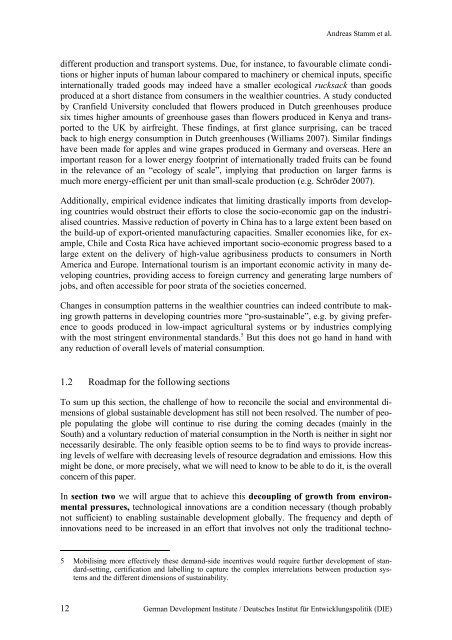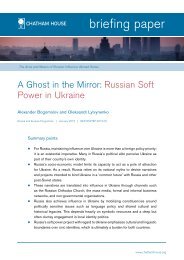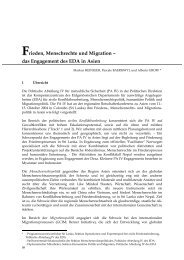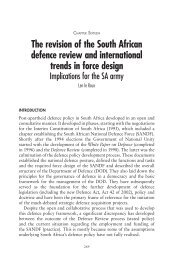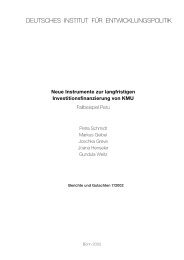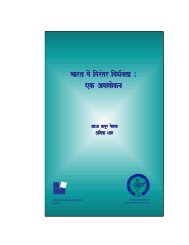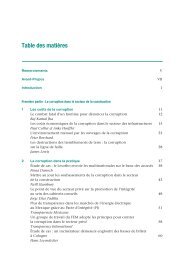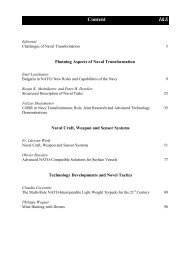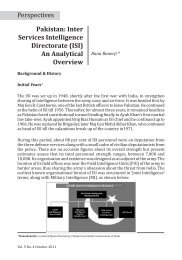Andreas Stamm Eva Dantas Doris Fischer Sunayana ... - ETH Zürich
Andreas Stamm Eva Dantas Doris Fischer Sunayana ... - ETH Zürich
Andreas Stamm Eva Dantas Doris Fischer Sunayana ... - ETH Zürich
Create successful ePaper yourself
Turn your PDF publications into a flip-book with our unique Google optimized e-Paper software.
<strong>Andreas</strong> <strong>Stamm</strong> et al.<br />
different production and transport systems. Due, for instance, to favourable climate conditions<br />
or higher inputs of human labour compared to machinery or chemical inputs, specific<br />
internationally traded goods may indeed have a smaller ecological rucksack than goods<br />
produced at a short distance from consumers in the wealthier countries. A study conducted<br />
by Cranfield University concluded that flowers produced in Dutch greenhouses produce<br />
six times higher amounts of greenhouse gases than flowers produced in Kenya and transported<br />
to the UK by airfreight. These findings, at first glance surprising, can be traced<br />
back to high energy consumption in Dutch greenhouses (Williams 2007). Similar findings<br />
have been made for apples and wine grapes produced in Germany and overseas. Here an<br />
important reason for a lower energy footprint of internationally traded fruits can be found<br />
in the relevance of an “ecology of scale”, implying that production on larger farms is<br />
much more energy-efficient per unit than small-scale production (e.g. Schröder 2007).<br />
Additionally, empirical evidence indicates that limiting drastically imports from developing<br />
countries would obstruct their efforts to close the socio-economic gap on the industrialised<br />
countries. Massive reduction of poverty in China has to a large extent been based on<br />
the build-up of export-oriented manufacturing capacities. Smaller economies like, for example,<br />
Chile and Costa Rica have achieved important socio-economic progress based to a<br />
large extent on the delivery of high-value agribusiness products to consumers in North<br />
America and Europe. International tourism is an important economic activity in many developing<br />
countries, providing access to foreign currency and generating large numbers of<br />
jobs, and often accessible for poor strata of the societies concerned.<br />
Changes in consumption patterns in the wealthier countries can indeed contribute to making<br />
growth patterns in developing countries more “pro-sustainable”, e.g. by giving preference<br />
to goods produced in low-impact agricultural systems or by industries complying<br />
with the most stringent environmental standards. 5 But this does not go hand in hand with<br />
any reduction of overall levels of material consumption.<br />
1.2 Roadmap for the following sections<br />
To sum up this section, the challenge of how to reconcile the social and environmental dimensions<br />
of global sustainable development has still not been resolved. The number of people<br />
populating the globe will continue to rise during the coming decades (mainly in the<br />
South) and a voluntary reduction of material consumption in the North is neither in sight nor<br />
necessarily desirable. The only feasible option seems to be to find ways to provide increasing<br />
levels of welfare with decreasing levels of resource degradation and emissions. How this<br />
might be done, or more precisely, what we will need to know to be able to do it, is the overall<br />
concern of this paper.<br />
In section two we will argue that to achieve this decoupling of growth from environmental<br />
pressures, technological innovations are a condition necessary (though probably<br />
not sufficient) to enabling sustainable development globally. The frequency and depth of<br />
innovations need to be increased in an effort that involves not only the traditional techno-<br />
5 Mobilising more effectively these demand-side incentives would require further development of standard-setting,<br />
certification and labelling to capture the complex interrelations between production systems<br />
and the different dimensions of sustainability.<br />
12<br />
German Development Institute / Deutsches Institut für Entwicklungspolitik (DIE)


